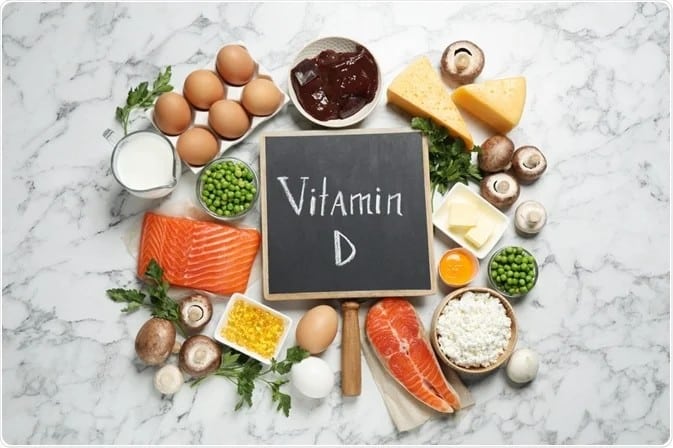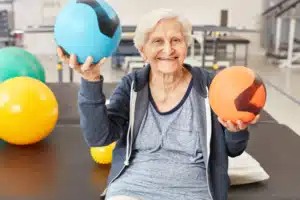We often hear how the sun can give us the recommended dose of Vitamin D if you expose yourself to about 10 minutes a day between noon and 4 pm; however, it is not always possible to rely on getting enough Vitamin D for seniors sitting in the sun.
When it comes to managing health and wellbeing, there seems to be a continual list of recommended practices and lifestyle choices to consider especially as we age. In recent years, following the discovery of vitamin D receptors throughout the body, its role in the prevention and treatment of chronic diseases has become an important area of study. The importance of Vitamin D for our senior loved ones is essential for a variety of reasons.
Avoiding Overwhelm
Keeping seniors healthy and happy as they continue to grow older is an ongoing process with many facets. With so many things to keep track of, it can be easy to let some things fall by the wayside even though they might be beneficial to health and wellbeing. Amid all the larger scale health concerns that seniors may be dealing with on a daily basis, things like vitamin deficiency often get ignored or neglected. However, a lack of essential vitamins and nutrients can cause a real problem for overall health, so it is worth prioritizing a healthy diet and nutritional supplements to ward off illness and injury.
Vitamin D Essentials
Getting regular doses of Vitamin D is incredibly important for seniors to maintain bone strength, density, and health. The body produces Vitamin D in response to sunlight and it is required to perform essential functions. Vitamin D helps regulate calcium absorption, cell growth, muscle movement, infection resistance, and nervous system communication and function. Insufficient levels of Vitamin D in the body makes it more prone to muscle weakness, bone pain, and other significant health conditions.
Sunlight as a Source of Vitamin D
General exposure to the sun is often enough to provide most people with the amount of Vitamin D they need to maintain the bodily functions Vitamin D is responsible for. But, for seniors who don’t spend a lot of time outside it can be hard to get enough from the sun alone.
Seniors and Vitamin D Deficiency
There are many lifestyle and physical health factors that make seniors more likely to experience a Vitamin D Deficiency than their younger counterparts. As age progresses, many seniors find themselves spending more time indoors and therefore getting less exposure to the sun. Many seniors also get less Vitamin D in their diet in older age, experience greater difficulty in intestinal absorption of the vitamin, and have thinner skin.
These factors all contribute to seniors being at a higher risk of Vitamin D deficiency. Taking active measures to ensure Vitamin D intake is at appropriate levels helps avoid any negative health implications.

Why Vitamin D for Seniors is Important
As previously mentioned, Vitamin D helps in the performance of functions that keep the body healthy and strong, but what tangible examples are available to demonstrate just how essential Vitamin D is for older adults?
Seniors who have consistent Vitamin D consumption are more likely to:
- Have the strength and balance to prevent falls
- Have a greater level of physical mobility and independence
- Have a lower risk of osteoporosis and other bone-health issues
- Have a lower risk of cardiovascular disease and other significant health conditions
In essence, Vitamin D is something that seniors and their caregivers should focus on to ensure insufficient levels do not lead to health complications and compromised independence.
Sources of Vitamin D
Getting enough Vitamin D can be tricky for seniors, whether it is because they just don’t spend as much time outside or because direct sun exposure is too strenuous and uncomfortable. Finding alternative sources of Vitamin D can be a bit of a challenge but solutions are readily available to prevent older adults from becoming Vitamin D deficient.
Integrating supplements and foods fortified with Vitamin D into daily routines is highly recommended. Some foods rich in Vitamin D include:
- Fatty fish – tuna, salmon, mackerel
- Herring and sardines
- Cod liver oil
- Beef liver
- Egg yolks
- Cheese
- Mushrooms
- Foods fortified with Vitamin D – milk, orange juice, cereal, oatmeal
Vitamin D Combined with Calcium
The body is not able to properly absorb calcium without sufficient levels of Vitamin D present. Calcium is also critical for maintaining bone health and protecting against health conditions like osteoporosis which are characterized by bone frailty.
Talking to a doctor or healthcare professional can help in detecting a Vitamin D deficiency and in determining the best approach to ensure healthy levels of essential vitamins and minerals are being consumed.



